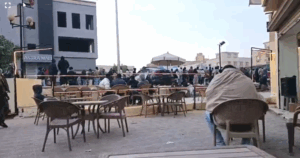Unamid head: ‘UNSC should consider stern action’ against holdout Darfur rebel leader
While security has improved in Darfur, inter-communal tensions are still high, with clashes over land and livestock, Jeremiah Mamabolo, the head of the joint United Nations-African Union peacekeeping mission (Unamid) told the United Nations Security Council (UNSC) on Monday. Mamabolo also recommended that the UNSC ‘consider stern action’ against Sudan Liberation Movement (SLM-AW) faction head Abdelwahid El Nur.
 Jeremiah Mamabolo, the head of Unamid briefing the United Nations Security Council (UNSC) in 2017 (File photo: UN)
Jeremiah Mamabolo, the head of Unamid briefing the United Nations Security Council (UNSC) in 2017 (File photo: UN)
While security has improved in Darfur, inter-communal tensions are still high, with clashes over land and livestock, Jeremiah Mamabolo, the head of the joint United Nations-African Union peacekeeping mission (Unamid) told the United Nations Security Council (UNSC) on Monday. Mamabolo also recommended that the UNSC ‘consider stern action’ against Sudan Liberation Movement (SLM-AW) faction head Abdelwahid El Nur.
Speaking via video conferencing to the UNSC, Mamabolo delivered his letest 90-day report covering the situation in Darfur from 11 June until 3 October this year. Mamabolo also said there was “continuing concern” voiced by displaced civilians over continued attacks and harassment, the destruction of farms, land occupation, and livestock theft.
Abdelwahid El Nur
Mamabolo lamented that the SLM-AW continues to hold out against joining the peace process. "I urge the Council to consider stem action against the SLA/M leader because, from all accounts, he prefers belligerence and armed struggle to the cessation of hostilities and a political process," he said.

SLM-AW faction leader Abdelwahid El Nur (File photo)
Mamabolo predicts that “it is highly unlikely that he would change this position any time soon. The Security Council may wish to consider stem measures against the SLA/M leader.”
Ethiopian Ambassador Taye Atske Selassie supported Mamabolo’s stance. With reference to the reports by the UN panel of experts on Darfur, he said: "Darfur rebel groups show no meaningful interest in ensuring peace in Darfur,” he said. “They are amassing huge benefits from criminal activities in neighbouring states and have no real incentive to pursue peace."
Darfur rebel groups have branded the report by the UN panel as ‘one-sided’, as in their view, it relies too much on data and information supplied by the Sudanese government.
Address root causes of conflicts
Mamabolo: “Unamid continues to focus on early warning, preventive measures, capacity-building and efforts to address the root causes of conflicts,” he said.
Mamabolo told UNSC members that on the humanitarian front, aid agencies continue to provide assistance to people in need, despite limited funding and problems accessing some affected areas.
Drawing attention to the importance of upholding the highest principles of human rights, he noted a decrease in new cases of human rights violations and abuses in the areas the Mission is responsible for.
Documented cases
Some 134 new cases involving 304 victims were documented by Unamid during the current reporting period, compared to 169 cases involving just 508 victims in the period 16 February-10 June, he said, noting that most violations were reported in and around internally displaced persons camps.
“Our focus should be on building the capacity of the government of Sudan to deal squarely with these challenges and to discharge its primary responsibility of protecting civilians and IDPs, providing security, addressing lack of confidence in reporting cases to authorities and lack of adequate law enforcement authorities and inability to provide basic social services.”
In his briefing, Mamabolo also told the 15-member Council that the Mission has embarked on its reconfiguration and drawdown, and is in the process of relocating its headquarters from the North Darfur capital of El Fasher to the Central Darfur capital of Zalingei.
Alongside the reduction of military personnel at the Mission, the process is being finalised to reduce civilian staff – both national and international, he added. In addition, ten team sites are slated for closure by the end of the year and three sector headquarters by June next year.
“We continue to monitor the impact on the security situation and protection of civilian in areas from which Unamid has withdrawn. So far, we have not witnessed any adverse impact,” he said.











 and then
and then